The proposed transformation of agriculture into an enterprise needs two significant shifts. Firstly, a conceptual shift in thinking on the role of the state and the market in agricultural transformation; and secondly, a critical rethink by the agricultural research and education systems towards learning, facilitation, and as co-creators of change, argues Dr C Shambu Prasad.
CONTEXT
The recent bold pronouncement by the Government of India in its Doubling Farm Income Report (GoI 2018) suggests a paradigm shift in the way we look at agriculture. Agriculture, the report suggests, needs to be seen as an enterprise and the farmer as an entrepreneur – necessitating adoption of business principles for positive net returns. The National Agricultural Research System (NARS), the report suggests, should take urgent steps to reorient and adopt a systems approach so as to include post-harvest management and monetisation, and furthermore, support farming as an enterprise and farmers as entrepreneurs. How prepared are our agricultural education systems for such a transformation and what would this mean for agricultural extension in India today? Are existing institutional arrangements in agriculture designed for productivity enhancement in any position? And, who could lead this change, given that their own experience in promoting entrepreneurship has been negligible? What should agricultural universities learn from ongoing experiments in entrepreneurial incubation and education? How should they customize this learning for the very unique contexts in agriculture today?
Just by sheer number, Indian farmers would constitute the largest community of private entrepreneurs in the world. They cope with vulnerabilities and practice their occupation with significant risks. These risks have multiplied with a drop in global commodity prices in recent years. It is not helpful that conventional agricultural economics treats farmers as risk-averse and facile policy recommendations that simple aggregation into a global value chain of agricultural commodity trade can enhance farm incomes and make farmers more entrepreneurial will not bring about the necessary change.
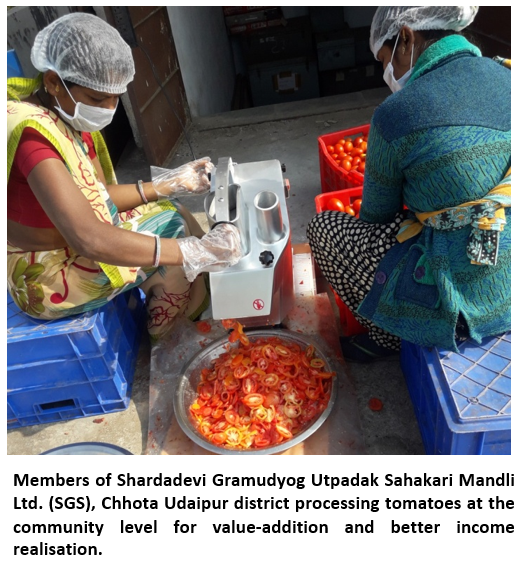 In this blog, I suggest that the proposed transformation of agriculture as an enterprise needs two significant shifts. First, a conceptual shift in thinking that goes beyond suggesting the state as the benevolent provider of sops and subsidies that can improve farm incomes, or the belief that the ubiquitous market can solve state failure. On the contrary, there is a need to reinstate the agency of the farmer and ensure that the farmer’s ability to experiment, not just technically but institutionally, is valued and forms the basis of any structural transformation. Second, there is need for a critical rethink by the agricultural research and education systems to transform themselves into learning organisations so as to rework themselves as facilitators and co-creators of change, rather than just continuing with their erstwhile role as the sole source of agricultural innovation. Entrepreneurship is closely linked to innovation, and while it is heartening to note that many agricultural universities today are setting up incubation centres and the curriculum in agricultural education is veering towards entrepreneurship, we need to also remind ourselves that most Indian agricultural universities have not been at the forefront of entrepreneurship in the past.
In this blog, I suggest that the proposed transformation of agriculture as an enterprise needs two significant shifts. First, a conceptual shift in thinking that goes beyond suggesting the state as the benevolent provider of sops and subsidies that can improve farm incomes, or the belief that the ubiquitous market can solve state failure. On the contrary, there is a need to reinstate the agency of the farmer and ensure that the farmer’s ability to experiment, not just technically but institutionally, is valued and forms the basis of any structural transformation. Second, there is need for a critical rethink by the agricultural research and education systems to transform themselves into learning organisations so as to rework themselves as facilitators and co-creators of change, rather than just continuing with their erstwhile role as the sole source of agricultural innovation. Entrepreneurship is closely linked to innovation, and while it is heartening to note that many agricultural universities today are setting up incubation centres and the curriculum in agricultural education is veering towards entrepreneurship, we need to also remind ourselves that most Indian agricultural universities have not been at the forefront of entrepreneurship in the past.
A change in the name of a scheme, a new Agriculture Grand Challenge alone without a change of institutions and mindsets is unlikely to lead to the desired transformation. It is here that agricultural extension can play an important role. This article argues that the NARS needs to do three thin
- Map and understand the evolving entrepreneurial ecosystem and learn to avoid some of the common misconceptions about entrepreneurship;
- Learn from some of the dynamic, but rich, insights on entrepreneurship from contemporary entrepreneurship education;
- Create an ecosystem of learning, experimentation, and innovation – from what not to learn and what to learn – by working with farmers and other intermediate organisations to build innovative business models. In short, co-create a future where they are equal partners with farmers and other actors in the ecosystem.
These ideas have been elaborated upon below.
Entrepreneurship is beyond start-ups and technology
There is indeed a lot to learn from the dynamic changes in India’s entrepreneurial ecosystem. The Flipkart-Walmart deal has been seen as a validation of India’s start-up ecosystem and a recent report (over!) estimates the number of start-ups as 40,000 (Yourstory, 2018). The recent thrust by the Government of India has seen India shoot up in the Ease of Doing Business, and India prides itself as having one of the largest numbers of incubators in the world. The regular updates on the Startup India website indicate progress on diverse fronts, such as establishing tinkering labs, registering start-ups, Atal Incubation Centres, etc. Details of state-wise incubators in India is given below in Table 1.
Table 1: State-wise incubators in India
Source: Collated from Start-up India website, October 2018 (https://www.startupindia.gov.in/ )
However, a closer look at these numbers reveals significant biases too. Rural, social and collective enterprises are rarely mentioned in these reports and much of the entrepreneurial buzz reveals a significant spatial bias that favours both capital cities and a disciplinary bias towards engineering colleges. The need for significant built-up space to house start-ups in incubation support schemes favours engineering and technical institutes with large laboratory facilities. This fails to recognise that incubation is more about intangible services, such as networking and mentoring, than tangible support such as space or funds. Further, it is important to realise that the need for incubation and entrepreneurship requires to be more inclusive in order to tap into the entrepreneurial spirit in rural and tribal India, as well as a recognition that not all entrepreneurship is about technology. While technology plays an important role in e-commerce or in those start-ups that have been invested in based on technological innovation, we do need to recognise that many innovations may not require significant technological change and investments. In fact, even in well-established set-ups in the US most investments by entrepreneurs are less than 50,000 US dollars and not many entrepreneurs prefer the venture capital route.
This is particularly important as we discuss entrepreneurship in agriculture. An ongoing study of sixteen social enterprises by the Vikas Anvesh Foundation (VAF) and the Institute of Rural Management Anand (IRMA) indicates that not all entrepreneurs in the agriculture space choose venture capital funding as the main source. Incubators need to promote entrepreneurship more broadly rather than favour and mentor only those that are scalable and venture-funded. In fact, a significant draw back in the Indian entrepreneurship space is the mistaken notion that the time from an idea to a scalable enterprise is small (3-5 years) and can be predicted. A bigger role for incubators (we are now realising at our own incubator), is in helping and supporting enterprises experiment so as to discover their business models. This alone can take a minimum of three years and involves significant experimentation and failure. How then should academic institutions look and learn in terms of teaching entrepreneurship? What useful lessons are to be had from existing entrepreneurship education?
On being entrepreneurial about teaching entrepreneurship
There has been increased interest in entrepreneurship teaching and research in the last decade. It is important for agricultural extension professionals to keep abreast with these developments that have happened largely within management institutes. The change in the concept of entrepreneurship and strategy – from motivational training of potential entrepreneurs to providing a more systemic understanding and application of the entrepreneurial spirit to larger social change – lies at the heart of the emerging field of social entrepreneurship and entrepreneurship on the whole.
As traditional lines blur between non-profit enterprises, government, and business, it is critical that students and researchers of agricultural extension see and equip themselves to contribute to the fast-emerging social entrepreneurial ecosystem. My own experiences of teaching and innovating on pedagogy in social entrepreneurship for over a decade has pointed to the need for constant innovation in pedagogy and engagement with the external world and ecosystem. In short, academics need to be entrepreneurial as well. A big challenge often lies in trying to bring the exciting entrepreneurial world to the classroom and getting students to meet and engage with entrepreneurs through long conversations and learn first-hand from their experiments and failures. Significant learning consists in trying to link entrepreneurship with other fields of design, sociology, development, etc. For instance, the idea that start-ups are not smaller versions of larger companies and that they are often involved in the process of search and not execution. These insights have emerged in recent thinking by Steve Blank on what has been known as the ‘lean start-up’.
Participants collectively reviewing Business Model Canvas on BMSE at IRMA, in November 2018.
Incorporating these insights and moving away from the conventional focus on the Business Plan to experimenting and reiterating with Business Model Canvases can open up greater possibilities for entrepreneurs who otherwise get put off by too many financial planning exercises. Our learning through four rounds of a customized Entrepreneurship Development Programme (EDP) on Building and Managing Social Enterprises (BMSE) in the last two years has been more important than entrepreneurial hard skills. It is creating a nurturing and empathetic environment for individuals to tap into and explore their entrepreneurial selves. A better focus on attitude can be acquired through peer learning and support and need not be competitive alone. Establishing this collaborative environment is often the key to entrepreneurial strategy and more effort needs to be put in that direction.
Co-creating an entrepreneurial ecosystem
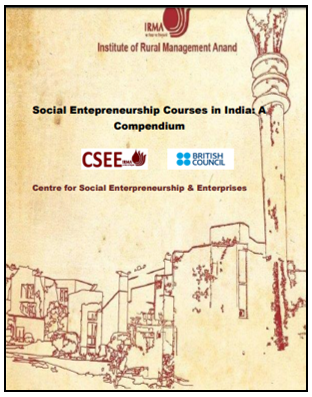 Entrepreneurship is new to most actors. It can be learnt and is better learnt together. It involves failures and hence one needs to have the attitude of an experimenter, having the ability to learn rapidly from failures and mistakes. Design thinking is an emerging discipline that is often an important first step for entrepreneurship. It is important that entrepreneur educators learn to root empathy for the customer, farmer, and other actors in the system. Design thinking helps reorient ourselves towards this key behavioural change. Further, it is also important to recognise that while some broad ideas on design thinking, lean start-ups, etc., can help start our journey in entrepreneurship it is important that educators and extensionists create spaces for sharing and collaborative learning.
Entrepreneurship is new to most actors. It can be learnt and is better learnt together. It involves failures and hence one needs to have the attitude of an experimenter, having the ability to learn rapidly from failures and mistakes. Design thinking is an emerging discipline that is often an important first step for entrepreneurship. It is important that entrepreneur educators learn to root empathy for the customer, farmer, and other actors in the system. Design thinking helps reorient ourselves towards this key behavioural change. Further, it is also important to recognise that while some broad ideas on design thinking, lean start-ups, etc., can help start our journey in entrepreneurship it is important that educators and extensionists create spaces for sharing and collaborative learning.
One of the important elements of IRMA’s foray into entrepreneurship is in creating an ecosystem for social enterprises and entrepreneurship. Learning from other experiments in India, we have found that it is important to have spaces where academicians and practitioners think and brainstorm together, where we break the walls and boundaries of learning, and accept that we need to learn from each other. A significant design element of XLRI’s National Conference on Social Entrepreneurship (NCSE) is a deliberate attempt to exclude academia from the platform. This strategic pause before action emphasises the need for educators to listen, unlearn, and reflect. Learning is critical to creating a different ecosystem. During the launch of IRMA’s incubator, we brought out a compendium of course offerings on social entrepreneurship that put together how the subject is taught across Indian higher education institutions. The idea was not to standardise offerings but to initiate a dialogue on what we could learn from each other, even as we retainour own individual academic orientations and recognise institutional constraints. Agricultural universities need to have more dialogues with management and other institutions and create networks for learning. The National Entrepreneurship Network (NEN) has by-passed mostof the agricultural universities, and it might be useful to rework these conversations.
An incubator at an academic institution becomes a laboratory of ideas. This does not call fora large infrastructure, but ideas for change are imperative. In fact, the incubator can be an expression of newer thinking in entrepreneurial education and practice. An incubator needs to be seen as an innovation platform that combines education, training, research, and action on innovation. The first year or two of an incubator should be focused on active experimentation – especially to figure out one’s own unique strengths and weaknesses. We at ISEED, (Incubator for Social Enterprises and Entrepreneurs for Development) and IRMA we, have found that we need to stick to what is unique, namely our focus on rural, social and collective enterprises rather than on following a ‘metoo’ process. With this conviction in place we know we have more value to add to this ecosystem than by just becoming another technology business incubator or TBI. We have found, through experimentation and trial and error, that not being able to invest in enterprises or claim as take enables us to have a different conversation with our incubatees, or as we now call them ‘social enterprise partners’. We have documented some of the learning of our ISEED journey. We have also found and reiterate our learning, saying that we should not own our incubatees, but actively work towards co-incubation. We are, in fact, glad to see them work with other incubators, for we do realise that entrepreneurs need several support structures and no single incubator can provide all of these. Some are good at funding; some are better in some domains and have a sectoral focus. Together, these incubators can help build an ecosystem but it is important to value the agency of the enterprise.
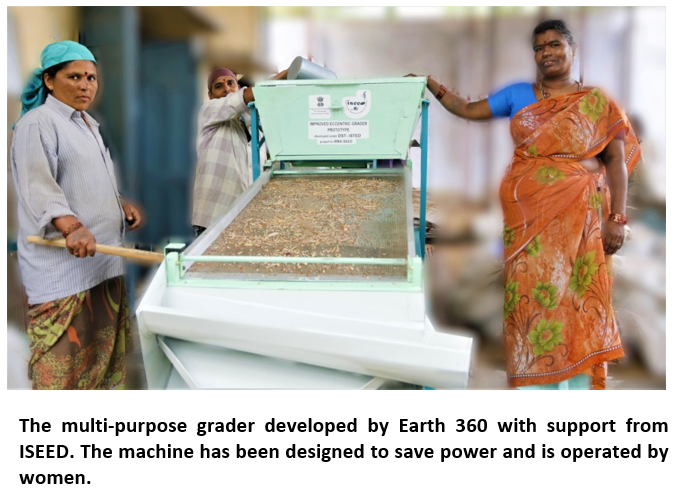 We have not shied away from technology but believe that this needs to be embedded suitably. One of the innovations we are proud of is a recent development, a multi-purpose grader with our partner Earth 360, an enterprise that works across the millet value chain. They had done most of the groundwork in identifying a problem from the field– the need for a grader that can enable community-level processing. This could lead to enhanced farm income. We supported the development of the grader through the incubator, and importantly, did this with other actors that included an engineering simulation partner, Altair, and a design partner, Big Stamp. We enabled the enterprise to work on their idea and helped them network with other opportunities. The innovation was a finalist at Startup India’s agriculture Grand Challenge and won special recognition at the Vibrant Gujarat Summit 201. While we did not create the innovation, we added value through other ways and continue to support their new start-up, Millet Machine Tools, as they seek to transform the millet value chain through a bouquet of machines.
We have not shied away from technology but believe that this needs to be embedded suitably. One of the innovations we are proud of is a recent development, a multi-purpose grader with our partner Earth 360, an enterprise that works across the millet value chain. They had done most of the groundwork in identifying a problem from the field– the need for a grader that can enable community-level processing. This could lead to enhanced farm income. We supported the development of the grader through the incubator, and importantly, did this with other actors that included an engineering simulation partner, Altair, and a design partner, Big Stamp. We enabled the enterprise to work on their idea and helped them network with other opportunities. The innovation was a finalist at Startup India’s agriculture Grand Challenge and won special recognition at the Vibrant Gujarat Summit 201. While we did not create the innovation, we added value through other ways and continue to support their new start-up, Millet Machine Tools, as they seek to transform the millet value chain through a bouquet of machines.
Finally, an entrepreneurial mindset is one that is also one that raises uncomfortable questions. We have been doing this in the Farmer Producer Organisations (FPO) space. For instance, we believe that an FPO needs the same, if not more, of a supportive environment as a start-up. They too could fail and they too need investments, mentoring, and support even if their institutional design does not allow for venture capital and other support. We thus would like to work with FPOs too and see how they could be incubated, or how resource institutions working with a few FPOs could benefit from these entrepreneurial insights.
References
YourStory.2018 (June).The India Startup Report. Bengaluru: YourStory.
https://yourstory.com/2018/06/presenting-india-startup-report-yourstory-overview-startup-ecosystem
 C Shambu Prasad is Professor,General Management – Strategy and Policy at the Institute of Rural Management Anand (IRMA). At IRMA he also chairs the Incubator for Social Enterprises and Entrepreneurs for Development, ISEED. He works on issues relating to sustainable agriculture and social innovation; and teaches courses on social entrepreneurship, managing collectives and public systems management. He can be reached at shambu@irma.ac.in and the incubator at iseed@irma.ac.in
C Shambu Prasad is Professor,General Management – Strategy and Policy at the Institute of Rural Management Anand (IRMA). At IRMA he also chairs the Incubator for Social Enterprises and Entrepreneurs for Development, ISEED. He works on issues relating to sustainable agriculture and social innovation; and teaches courses on social entrepreneurship, managing collectives and public systems management. He can be reached at shambu@irma.ac.in and the incubator at iseed@irma.ac.in

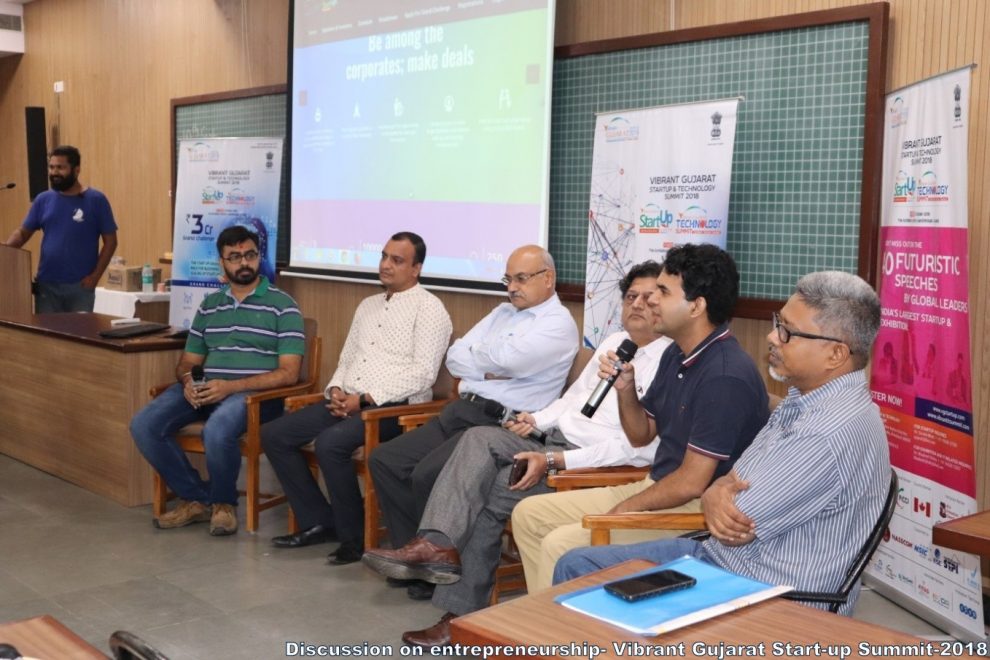



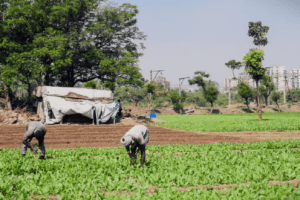

“The faculty of agricultural/ veterinary universities are tuned to focus on technology transfer to increase the crop/livestock production and all the efforts are geared to promote Transfer of Technology. Value addition and Marketing are largely neglected. Of late I am noticing that the engineering and management graduates ( not agriculture and veterinary science graduates ) are entering into farm business. I agree with the author that the agricultural extension professionals must keep abreast with the developments in entrepreneurship that have happened largely within management institutes. Establishing incubation centres and incorporating the entrepreneurship courses in the curriculum alone may not help without a change in the mindset of the people concerned. The status of the farmer remains low and doubling of his income remains a distant dream till his farm is transformed into an enterprise. I congratulate Dr.C Shambu Prasad for this useful blog”.